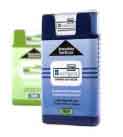 It takes patience to be in the drug business.
It takes patience to be in the drug business.
Richmond drug device maker Intelliject has been at it since 2004, working its way through the labyrinth of FDA approval processes and domestic and international patent filings. It’s even in the midst of a patent infringement suit filed against it by a major pharmaceutical company, all before Intelliject has even seen its flagship product, the EpiCard, make it to market.
The EpiCard is a credit card-size device that allows patients to inject themselves with a drug. Twin brothers Evan and Eric Edwards founded the card and the company almost seven years ago.
Spencer Williamson, the 48-year-old CEO, runs the company these days. And when you hear Williamson explain how big the potential market is for such a product, it becomes clear why patience is a virtue.
Intelliject, which has 25 employees, was awarded yet another patent – its 90th – this month. BizSense spoke with Williamson about the long approval processes the company goes through, how Intelliject lives off millions from a big pharma backer and what other products it has up its sleeve.
The following is an edited transcript.
 Richmond BizSense: Last time BizSense checked in with you guys, the EpiCard was still making its way through the approval stage. Where do things stand with that process?
Richmond BizSense: Last time BizSense checked in with you guys, the EpiCard was still making its way through the approval stage. Where do things stand with that process?
Spencer Williamson: We’re under review with the FDA as we speak. It’s a standard FDA process. It’s going quite well. Once it’s approved, we’ll be able to launch the EpiCard in the U.S.
RBS: After all these years, is there a timeline as to when the product might finally hit the market?
SW: I can’t give out specifics on the timing. All I can really say is we’re under review.
RBS: Intelliject received a major shot in the arm from drug maker Sanofi-aventis in 2009. How does that relationship work? Is your company still living off that money, or are there other sources of revenue?
SW: Sanofi’s role is to commercialize the product with sales, marketing and manufacturing. Our role is to get FDA approval. We’re moving forward on both those fronts. They paid us $25 million up front. And we have an additional $205 million in milestones that we are achieving as we speak. We are being paid to hit milestones. So we’re very well capitalized and very blessed to be that way. That money allowed us to get the EpiCard to the FDA and to fund three other projects in our pipeline.
RBS: How big is the potential market for this injector?
SW: Really big — like billions. There is competition, but nobody is really doing what we’re doing. There are device companies out there. There are drug companies out there. [The EpiCard] is a drug and device. We take drugs that are already approved and reformulate them to work with our device products.
RBS: With you running the company, what roles do the Edwards brothers play these days?
SW: They still play big roles in the company, both on the development side of the business. Eric is chief medical officer. Evan is vice president of product development.
RBS: As twin brothers they have the family connection, but how did you get in the mix?
SW: I was introduced to them several years ago by Jim Ukrop. I worked for a large medical device company at the time, and Ukrop called me up and suggested I meet these guys. I met them in 2005 and joined them in 2006.
RBS: The business Intelliject is in is ripe for patent infringement lawsuits. Has the company ever been hit with one?
SW: Our first product, the EpiCard, is going to compete with the EpiPen made by King Meridian. They have sued us for alleged patent infringement. It’s our belief and that of our lawyers that it’s a baseless case and one done with the intention of trying to slow us down. We believe it will be resolved favorably in court. We were sued in Delaware and have a trial date in early 2012.
RBS: Are there other products in the pipeline?
SW: We have three pipeline products, one in diabetes and a couple in cardiovascular. It’s really taking what we’ve done with our first product and replicating that process. All of our products are late-stage products. But we have not made further FDA submissions on pipeline products yet.
Michael Schwartz is a BizSense reporter. Please send news tips to [email protected].
 It takes patience to be in the drug business.
It takes patience to be in the drug business.
Richmond drug device maker Intelliject has been at it since 2004, working its way through the labyrinth of FDA approval processes and domestic and international patent filings. It’s even in the midst of a patent infringement suit filed against it by a major pharmaceutical company, all before Intelliject has even seen its flagship product, the EpiCard, make it to market.
The EpiCard is a credit card-size device that allows patients to inject themselves with a drug. Twin brothers Evan and Eric Edwards founded the card and the company almost seven years ago.
Spencer Williamson, the 48-year-old CEO, runs the company these days. And when you hear Williamson explain how big the potential market is for such a product, it becomes clear why patience is a virtue.
Intelliject, which has 25 employees, was awarded yet another patent – its 90th – this month. BizSense spoke with Williamson about the long approval processes the company goes through, how Intelliject lives off millions from a big pharma backer and what other products it has up its sleeve.
The following is an edited transcript.
 Richmond BizSense: Last time BizSense checked in with you guys, the EpiCard was still making its way through the approval stage. Where do things stand with that process?
Richmond BizSense: Last time BizSense checked in with you guys, the EpiCard was still making its way through the approval stage. Where do things stand with that process?
Spencer Williamson: We’re under review with the FDA as we speak. It’s a standard FDA process. It’s going quite well. Once it’s approved, we’ll be able to launch the EpiCard in the U.S.
RBS: After all these years, is there a timeline as to when the product might finally hit the market?
SW: I can’t give out specifics on the timing. All I can really say is we’re under review.
RBS: Intelliject received a major shot in the arm from drug maker Sanofi-aventis in 2009. How does that relationship work? Is your company still living off that money, or are there other sources of revenue?
SW: Sanofi’s role is to commercialize the product with sales, marketing and manufacturing. Our role is to get FDA approval. We’re moving forward on both those fronts. They paid us $25 million up front. And we have an additional $205 million in milestones that we are achieving as we speak. We are being paid to hit milestones. So we’re very well capitalized and very blessed to be that way. That money allowed us to get the EpiCard to the FDA and to fund three other projects in our pipeline.
RBS: How big is the potential market for this injector?
SW: Really big — like billions. There is competition, but nobody is really doing what we’re doing. There are device companies out there. There are drug companies out there. [The EpiCard] is a drug and device. We take drugs that are already approved and reformulate them to work with our device products.
RBS: With you running the company, what roles do the Edwards brothers play these days?
SW: They still play big roles in the company, both on the development side of the business. Eric is chief medical officer. Evan is vice president of product development.
RBS: As twin brothers they have the family connection, but how did you get in the mix?
SW: I was introduced to them several years ago by Jim Ukrop. I worked for a large medical device company at the time, and Ukrop called me up and suggested I meet these guys. I met them in 2005 and joined them in 2006.
RBS: The business Intelliject is in is ripe for patent infringement lawsuits. Has the company ever been hit with one?
SW: Our first product, the EpiCard, is going to compete with the EpiPen made by King Meridian. They have sued us for alleged patent infringement. It’s our belief and that of our lawyers that it’s a baseless case and one done with the intention of trying to slow us down. We believe it will be resolved favorably in court. We were sued in Delaware and have a trial date in early 2012.
RBS: Are there other products in the pipeline?
SW: We have three pipeline products, one in diabetes and a couple in cardiovascular. It’s really taking what we’ve done with our first product and replicating that process. All of our products are late-stage products. But we have not made further FDA submissions on pipeline products yet.
Michael Schwartz is a BizSense reporter. Please send news tips to [email protected].
Keep up the good work, Intelliject! Your company and it’s products are great assets to our Richmond community.